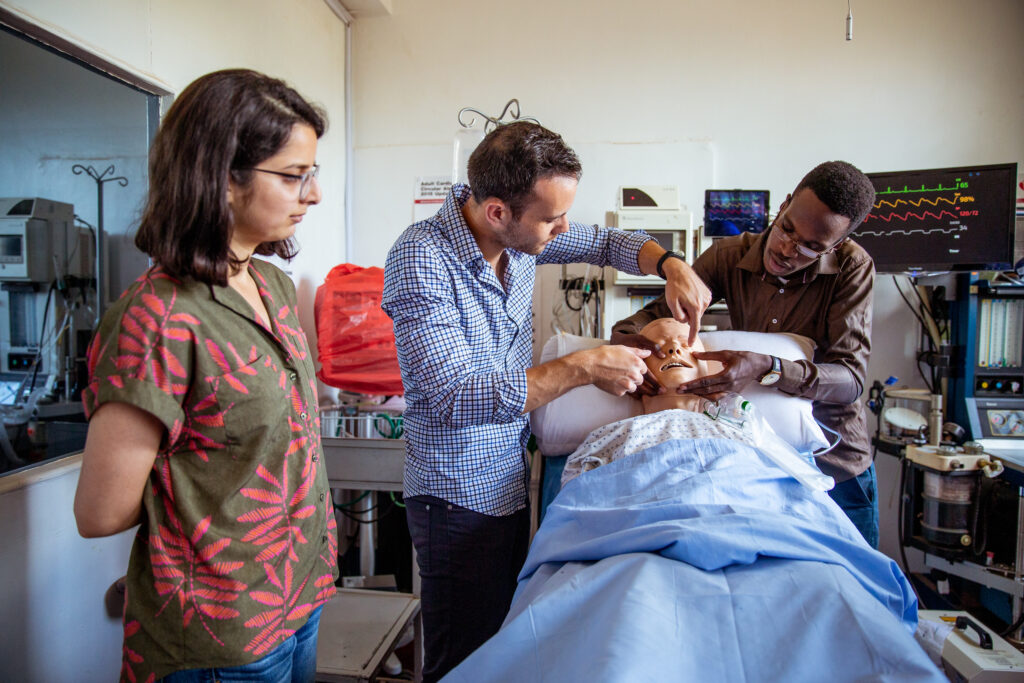
UCSF’s Department of Emergency Medicine launched a World Health Organization (WHO) Collaborating Centre for Emergency and Trauma Care in 2017, the first in North America and just the second in the world. Late in 2022, the Centre became a joint effort, co-located in the Department of Emergency Medicine (DEM) and the Institute for Global Health Sciences (IGHS), and expanded its scope to become the WHO Collaborating Centre for Emergency, Critical and Operative Care.
The work responds to a resolution the World Health Assembly adopted in 2019 making a commitment to ensure timely care for the acutely ill and injured, an area that has often been overlooked in global health. UCSF has long been a leader in this area, due in part to the DEM’s pioneering efforts (about which, more below) and to the leadership of IGHS’s founding executive director, former UCSF Chancellor Haile Debas, MD. In 2021, Debas’s legacy was formalized in the IGHS Center for Health Equity in Surgery and Anesthesia, which is now partnering with the DEM to co-lead the WHO Collaborating Centre.
The WHO leads international global health efforts with a limited operating budget. It expands its impact through partnerships with institutions, like UCSF, rich in expertise and grant funding. The Collaborating Centre for Emergency, Critical and Operative Care generates research, training, curriculum development, and toolkits that the WHO uses to help low- and middle-income countries improve facilities and standards of care.
The two new co-directors are Michael Lipnick, MD, an associate professor of anesthesia who previously led the IGHS Affiliate Program, and Carol Chen, MD, MPH, an associate professor of emergency medicine and member of the IGHS Affiliate Program. They explain the expanded scope and shared leadership of the Centre as an effort to reflect the interdisciplinary nature of the work that feeds it and to further strengthen collaborations and break down silos.
“The idea was to recognize that the work encompasses more than just emergency and trauma care, and all of us who do work in global health at UCSF can intersect in creative ways,” Chen said. “We want to open the door to anyone who is interested in collaborating with us.”
Lipnick added: “With the expanded scope, I think there’s a lot of potential for us to utilize this new center to support the work of faculty and trainees, to own the impact of our work, and to strengthen the partnership with the World Health Organization.”
In its first five years in the DEM, the Centre helped the WHO develop and implement a basic emergency care course, which has trained hundreds of thousands of providers on several continents. It has also made major contributions – as a member of the Global Alliance for Care of the Injured – to the tools and policies the WHO uses to improve care for injured patients in low- and middle-income countries.
The co-directors hope to deepen the Centre’s expertise in implementation science – to guide how different countries and regions can adapt the WHO’s global blueprints to their particular needs – and curriculum development, to ensure that the trainings offered to providers around the world empower them to act.
Any UCSF faculty interested in working with the WHO Collaborating Centre for Emergency, Critical and Operative Care should reach out to Lipnick or Chen.
Photos Sala Lewis. IGHS MS alumna Shivani Subhedar (’20) is also pictured.